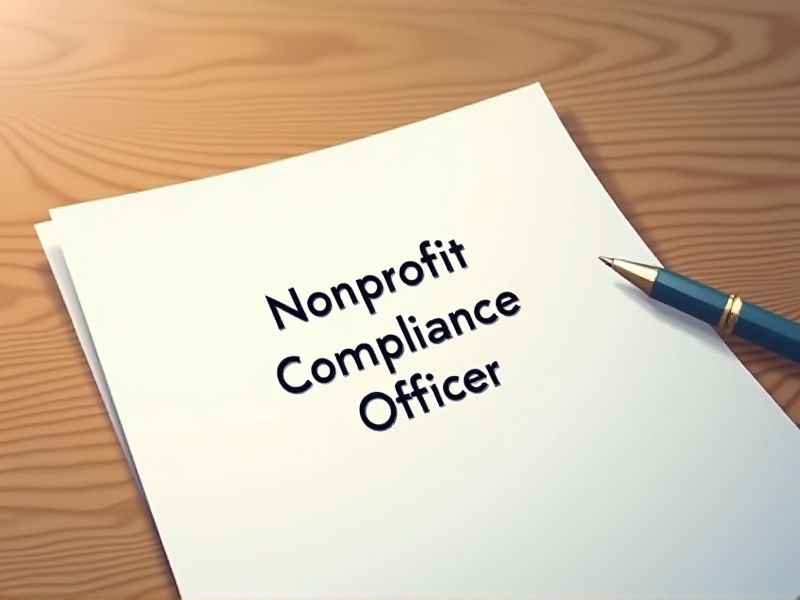
A Nonprofit Compliance Officer plays a critical role in ensuring that an organization adheres to legal and regulatory standards, safeguarding its integrity and reputation. Certifications in areas like nonprofit management, legal compliance, and ethics provide these professionals with specialized knowledge to navigate complex regulations effectively. Holding relevant certifications demonstrates a commitment to best practices and enhances credibility with stakeholders. Here are key certifications that a Nonprofit Compliance Officer might require.
Certified Compliance & Ethics Professional (CCEP)
The role of a Certified Compliance & Ethics Professional (CCEP) ensures a Nonprofit Compliance Officer is equipped with the necessary knowledge to navigate complex regulatory landscapes effectively. Lack of certification could result in inadequate policy implementation, potentially leading to legal and ethical breaches. Achieving CCEP status signifies a commitment to upholding high standards of integrity within the organization, promoting trust among donors and stakeholders. Certification enhances the ability to identify and mitigate risks, ensuring the nonprofit's operations align with legal and ethical requirements.
Certified Nonprofit Professional (CNP)
Nonprofit Compliance Officers face complex regulatory landscapes, and being a Certified Nonprofit Professional provides the necessary expertise in nonprofit laws and ethical standards. With a CNP certification, officers are better equipped to implement consistent compliance measures, minimizing risks of legal penalties. The certification ensures an understanding of financial stewardship which is critical in maintaining donor trust and organizational credibility. CNPs also gain strategic management skills, enhancing their ability to align compliance with broader organizational goals.
Certified Fraud Examiner (CFE)
Nonprofits face complex regulations and a Certified Fraud Examiner can help ensure compliance by identifying potential risks and preventing fraud. Given their expertise, CFEs provide critical insights into financial reporting transparency, which is essential for maintaining donor trust. As nonprofits often operate with limited resources, a CFE's ability to detect and prevent financial discrepancies can lead to significant cost savings. Their knowledge supports the development of strong internal controls, which are vital for fulfilling the nonprofit's mission effectively.
Certified Risk Management Professional (CRMP)
Nonprofit organizations face various regulatory compliance requirements, and a Certified Risk Management Professional (CRMP) equips a Compliance Officer with the skills to identify and mitigate risks effectively. CRMP training helps in developing risk assessment strategies, crucial for ensuring the nonprofit avoids penalties and legal issues. Knowledge gained from CRMP certification enables a Compliance Officer to implement robust internal controls, enhancing the organization's financial integrity. Understanding risk management principles assists in fostering a culture of transparency and accountability within the nonprofit sector.
Nonprofit Management Certificate
A Nonprofit Management Certificate provides specialized knowledge essential for a compliance officer to navigate complex regulatory landscapes effectively. It equips professionals with strategic insights into nonprofit governance, enhancing their ability to ensure adherence to legal standards. Such a certificate validates the officer's competency in developing and implementing policies that protect the organization from legal noncompliance risks. Gaining this certification can also enhance career prospects by demonstrating a commitment to ethical and systematic nonprofit management.
Certified Internal Auditor (CIA)
Certified Internal Auditors (CIA) possess a deep understanding of internal controls, which is crucial for ensuring that a nonprofit's operations align with regulatory requirements. Their training in risk management helps identify potential areas of non-compliance, reducing the likelihood of financial or legal issues. By implementing thorough auditing practices, a CIA can provide assurance that funds are being used effectively, enhancing donor trust and organizational credibility. The objective analysis and reporting skills of a CIA support informed decision-making, paving the way for robust governance within nonprofits.
Governance Professional Certification
Nonprofits face increasing regulatory scrutiny, and a Governance Professional Certification equips compliance officers with the necessary knowledge to navigate these complex frameworks. With this certification, professionals are better prepared to implement effective risk management strategies, minimizing potential legal and ethical issues. Enhanced understanding of governance principles ensures that compliance officers can advocate for transparency and accountability within their organizations. This certification also boosts credibility, helping nonprofits gain trust from donors and stakeholders.
Project Management Professional (PMP)
Nonprofit organizations often face complex regulatory requirements, and having a PMP certification equips a Compliance Officer with structured approaches to manage these tasks efficiently. The PMP certification ensures that the Compliance Officer can apply standardized processes, reducing the risk of non-compliance due to oversight. PMP training emphasizes resource optimization, which is crucial for nonprofits that typically work with limited budgets. The leadership and communication skills learned in PMP training enhance a Compliance Officer's ability to coordinate with various stakeholders, ensuring ethical and legal standards are consistently upheld.
Certified in Healthcare Compliance (CHC)
Certification in Healthcare Compliance (CHC) enhances a nonprofit compliance officer's understanding of extensive healthcare regulations. It reinforces their ability to identify and mitigate compliance risks, protecting the organization from legal issues. The certification also increases the officer's credibility, fostering trust with stakeholders and regulators. With evolving healthcare laws, staying certified ensures the officer remains updated on best practices and regulatory changes.
Certificate in Legal and Regulatory Compliance
The increasing complexity of laws and regulations governing nonprofit organizations demands specialized knowledge, which a Certificate in Legal and Regulatory Compliance provides. This credential equips compliance officers with the necessary skills to identify and mitigate legal risks effectively, ensuring organizational adherence to applicable statutes. Nonprofit entities face heightened scrutiny regarding financial transparency and ethical conduct, making such specialized training essential for maintaining trust and integrity. By obtaining this certification, compliance officers enhance their ability to navigate regulatory challenges, thereby safeguarding their organization's mission and financial stability.
Summary
As a reader, you'll gain confidence knowing a Nonprofit Compliance Officer is certified, ensuring adherence to legal and ethical standards. Certification enhances their expertise, resulting in improved organizational compliance and risk management. This leads to enhanced credibility and trust from stakeholders, benefiting overall reputation. Organizations can expect reduced legal risks and a more informed approach to governance.
